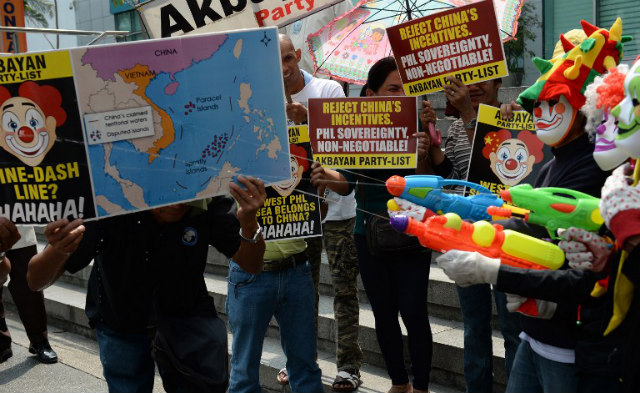From Rappler (Mar 24): PH 'fully committed' to file pleading vs China
!['REJECT CHINA'S INCENTIVES.' Activists dressed as clowns and holding water pistols spray a map illustrating China's claim to the South China Sea during a protest in front of the Chinese consular office in Makati on March 3, 2014. Photo by Ted Aljibe/AFP 'REJECT CHINA'S INCENTIVES.' Activists dressed as clowns and holding water pistols spray a map illustrating China's claim to the South China Sea during a protest in front of the Chinese consular office in Makati on March 3, 2014. Photo by Ted Aljibe/AFP]()
'REJECTCHINA China 's claim to the South China Sea during a protest in front of the Chinese consular office in Makati
In the face of incentives from China and warnings about a possible backlash, thePhilippines reassured the public it will file its written pleading against China
Solicitor General Francis Jardeleza told Rappler on Monday, March 24, that thePhilippines
The country “is fully committed to submitting our memorial or written pleading to the arbitral tribunal by March 30, 2014,” Foreign Secretary Albert Del Rosario said in a speech on Friday, March 21.
Del Rosario said thePhilippines
“This principled stance of doing what is right has been consistently articulated by President Benigno S Aquino III in 5 succinct words: 'What is ours is ours,'” Del Rosario said at the Annual Spring Summit of the Asia Pacific Council of American Chambers of Commerce.
ThePhilippines ' lawyer in its case against China
“To be clear: my instructions have always been, and remain, to file the memorial on March 30, as provided in the rules of procedure issued by the arbitral tribunal,” Reichler told Rappler on Sunday, March 23.
These reassurances came after government insiders disclosed an offer fromChina to stop the Philippines China
Seen to agitateChina China
'Very strong on merits'
The memorial will also contain arguments about a major hurdle: Does the tribunal have jurisdiction over the case? (READ: PH faces major hurdle in China case)
Jardeleza said that in other arbitration proceedings, parties “bifurcate” the case. This means tackling jurisdiction first, then the merits. In these cases, Jardeleza said the first question is: “Do you or do you not have jurisdiction? Indeed if there is no jurisdiction, there is no need to go into the merits.”
ThePhilippines
He said the country chose to do this because it is “very strong on the merits.”
“If you have a very strong case, you do not talk about jurisdiction. You go to straight to the case,” Jardeleza explained.
“And then,” he added, “if you convince the judges that you're strong on the merits and our claim is just, then the issue of jurisdiction will be folded in as a win on the merits. That's the reason why while ordinarily, you go first for a question on jurisdiction, in the particular circumstances of this case, the legal team decided that we propose – and we were allowed – to discuss jurisdiction and the merits at the same time.”
It ends up cheaper, too, “because then you just spend once on one memorial,” Jardeleza said. He declined to reveal the cost.
He said the tribunal will rule on jurisdiction “together with the merits.”Manila
http://www.rappler.com/nation/53740-philippines-committed-case-china

'REJECT
In the face of incentives from China and warnings about a possible backlash, the
Solicitor General Francis Jardeleza told Rappler on Monday, March 24, that the
The country “is fully committed to submitting our memorial or written pleading to the arbitral tribunal by March 30, 2014,” Foreign Secretary Albert Del Rosario said in a speech on Friday, March 21.
Del Rosario said the
“This principled stance of doing what is right has been consistently articulated by President Benigno S Aquino III in 5 succinct words: 'What is ours is ours,'” Del Rosario said at the Annual Spring Summit of the Asia Pacific Council of American Chambers of Commerce.
The
“To be clear: my instructions have always been, and remain, to file the memorial on March 30, as provided in the rules of procedure issued by the arbitral tribunal,” Reichler told Rappler on Sunday, March 23.
These reassurances came after government insiders disclosed an offer from
Seen to agitate
'Very strong on merits'
The memorial will also contain arguments about a major hurdle: Does the tribunal have jurisdiction over the case? (READ: PH faces major hurdle in China case)
Jardeleza said that in other arbitration proceedings, parties “bifurcate” the case. This means tackling jurisdiction first, then the merits. In these cases, Jardeleza said the first question is: “Do you or do you not have jurisdiction? Indeed if there is no jurisdiction, there is no need to go into the merits.”
The
He said the country chose to do this because it is “very strong on the merits.”
“If you have a very strong case, you do not talk about jurisdiction. You go to straight to the case,” Jardeleza explained.
“And then,” he added, “if you convince the judges that you're strong on the merits and our claim is just, then the issue of jurisdiction will be folded in as a win on the merits. That's the reason why while ordinarily, you go first for a question on jurisdiction, in the particular circumstances of this case, the legal team decided that we propose – and we were allowed – to discuss jurisdiction and the merits at the same time.”
It ends up cheaper, too, “because then you just spend once on one memorial,” Jardeleza said. He declined to reveal the cost.
He said the tribunal will rule on jurisdiction “together with the merits.”
http://www.rappler.com/nation/53740-philippines-committed-case-china
















